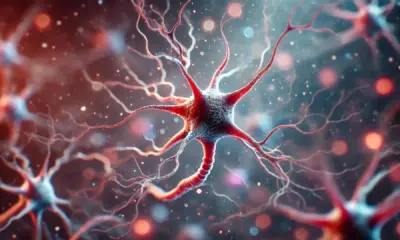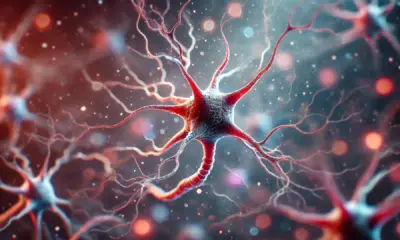Lifestyle
Researchers Win Ig Nobel Prize for Unusual Cow Painting Study

A team of researchers from Japan received the prestigious Ig Nobel Prize for their unconventional study exploring whether painting cows with zebra-like stripes can deter flies. The awards ceremony took place at Boston University on March 14, 2024, celebrating humorous yet thought-provoking scientific research.
The Japanese researchers, led by Tomoki Kojima, tested their theory by applying tape to Japanese beef cows and spray painting them with white stripes. Their findings suggested that the striped paint job resulted in fewer flies being attracted to the cows, leading to less irritation for the animals. Despite the intriguing results, Kojima acknowledged that implementing this technique on a larger scale would pose challenges.
The Ig Nobel Prizes, organized by the Annals of Improbable Research, honor unconventional research that elicits laughter and contemplation. The ceremony featured a range of quirky studies, including research from a European team which concluded that consuming alcohol can sometimes enhance foreign language skills, and a lengthy investigation into fingernail growth.
Marc Abrahams, the ceremony’s master of ceremonies and editor of the magazine, noted the whimsical nature of scientific discovery: “Every great discovery ever, at first glance seemed screwy and laughable. The Ig Nobel Prizes celebrate ALL these discoveries.”
The 35th annual ceremony began with the audience throwing paper airplanes at the stage, a tradition that adds to the event’s light-hearted atmosphere. Several winners unable to attend had their speeches read by notable Nobel laureates, including Esther Duflo, who won a Nobel Prize for her innovative approaches to combating global poverty.
In a playful nod to the theme of digestion, the event featured a mini-opera about gastroenterologists and their patients. Performers humorously sang about the challenges of treating stomach ailments, often brought on by patients indulging in pizza and chili dogs.
The ceremony also included a segment aptly named the “24-second lecture,” where researchers had a brief window to convey their work. Among those presenting were Gus Rancatore, who humorously licked an ice cream cone, and Trisha Pasricha, who discussed the potential health risks of smartphone usage while in the restroom.
When any winner exceeded their allotted time, a man dressed in a suit with a dress would appear, humorously urging them to “Please stop. I’m bored.”
Other notable winners this year included a research team from India, who examined the influence of foul-smelling shoes on the use of shoe racks, and a collaboration between scientists from the United States and Israel that explored the effects of consuming Teflon on food volume. Additionally, an international group investigated whether giving alcohol to bats impaired their flying abilities.
Francisco Sanchez, one of the researchers studying the effects of alcohol on bats, expressed gratitude for the recognition. He explained that their research indicated bats were not inclined to consume rotten fruit, which often contains higher alcohol levels. “They actually got drunk similar to what happens to us,” Sanchez stated. “When you take some ethanol, you move slower and your speech is impaired.”
Adding to the event’s excitement, a team of European researchers who studied the physics of pasta sauce presented their findings with a theatrical flair. One member donned a chef’s outfit with a fake mustache, while another dressed as a large ball of mozzarella cheese, playfully engaging with the audience.
The Ig Nobel Prize ceremony serves as a reminder that scientific inquiry can be both serious and entertaining, celebrating research that challenges conventional thinking while providing a platform for laughter and creativity.
-

 Technology4 months ago
Technology4 months agoDiscover the Top 10 Calorie Counting Apps of 2025
-

 Health2 months ago
Health2 months agoBella Hadid Shares Health Update After Treatment for Lyme Disease
-

 Health3 months ago
Health3 months agoErin Bates Shares Recovery Update Following Sepsis Complications
-

 Technology3 weeks ago
Technology3 weeks agoDiscover 2025’s Top GPUs for Exceptional 4K Gaming Performance
-

 Technology2 months ago
Technology2 months agoElectric Moto Influencer Surronster Arrested in Tijuana
-

 Technology4 months ago
Technology4 months agoDiscover How to Reverse Image Search Using ChatGPT Effortlessly
-

 Technology4 months ago
Technology4 months agoMeta Initiates $60B AI Data Center Expansion, Starting in Ohio
-

 Technology4 months ago
Technology4 months agoRecovering a Suspended TikTok Account: A Step-by-Step Guide
-

 Health4 months ago
Health4 months agoTested: Rab Firewall Mountain Jacket Survives Harsh Conditions
-

 Lifestyle4 months ago
Lifestyle4 months agoBelton Family Reunites After Daughter Survives Hill Country Floods
-

 Technology3 months ago
Technology3 months agoUncovering the Top Five Most Challenging Motorcycles to Ride
-

 Technology4 weeks ago
Technology4 weeks agoDiscover the Best Wireless Earbuds for Every Lifestyle





















